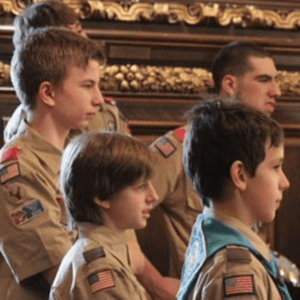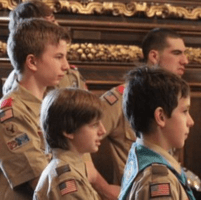By Walter Block

It was once an honor to earn a merit badge in the Boy Scouts. Becoming a Star Scout was a privilege, a Life Scout was something fantastic, and an Eagle Scout was the very tip of the apex. Few achieved that pinnacle, and those who did treasured it for their entire lives. But even those who didn’t attain these levels were still enriched by the Boy Scouts via lessons in life skills and teamwork.
Sadly, the Boy Scouts of America filed for bankruptcy on Feb. 18, 2020. First formed in 1910, this organization was once one of the most popular institutions in the entire country. Why its demise?
The simple answer is that the Boy Scouts succumbed to the threats of political correctness and wokesterism, particularly through the acceptance of homosexuality and feminism.
There were more than 92,000 cases filed against the Boy Scouts for sexual abuse. Like the Catholic Church, which dealt with priests abusing young boys, the Boy Scouts found themselves infiltrated by homosexual Scout leaders who did the same to their young charges.
One wonders why homosexual scoutmasters were welcomed into the ranks of scouting in the first place. Fifty years ago the idea of a gay scoutmaster would have been anathema. The Scout Oath itself—“On my honor I will do my best to do my duty to God and my country and to obey the Scout Law; to help other people at all times; to keep myself physically strong, mentally awake, and morally straight”—precludes homosexual behavior. But again, political correctness got the upper hand.
It was deemed impermissible to not welcome queer Boy Scout leaders into the organization. In the view of the Boy Scouts, gays were entirely within their “rights” to insist on taking leadership roles working with young boys. They are, after all, one of the demographics explicitly and specifically legally protected against discrimination in the United States. But parents of impressionable 13-year-old boys were not exactly thrilled with this prospect. They pulled their sons out of the organization in droves, leading to its drastic decline.
And then the feminists demanded that girls be allowed to join. This is more than passing curious given that there was a perfectly good and very similar organization, the Girl Scouts, for the feminine sex. Would boys have been welcomed into that organization? Don’t be silly. That’s an offensive, sexist suggestion! But the obverse is not only allowed in the social justice philosophy, but actually required.
Yet the demise of the Boy Scouts may not properly be fully laid at the doors of the feminists and the queer communities. These groups were only accessing what the law of the land offered them. No, the Boy Scouts went under due to laws which weakened the more basic human right of free association: that no innocent person may properly be compelled to associate with anyone else—no exceptions here—against his will.
Of course, homosexuals themselves violate this legislation. They rule out half the human race as bed partners and romantic love interests. As do the heterosexuals. They are guilty of the exact same “crime”—of discrimination! Only the bisexuals are innocent of this “discriminatory practice.” So there we have it: the logic of anti-discrimination laws lead to compulsory bisexuality.
The counterargument to the foregoing is that anti-discrimination laws should and do apply, only to commercial, and not personal, interactions. But why should we accept so facile a distinction? Surely, if it is wrong to discriminate against women, gays, and members of certain ethnic groups, this should apply to all realms of human interaction, the personal as well as the business and employment world. Otherwise, we are faced with anomaly that the personal is relatively unimportant and only commerce is important.
Perish the thought that this could be possible…
Walter Block is an economics professor at Loyola University and a Mises Institute senior fellow. He is author of several classic books on libertarian ethics, including Defending the Undefendable (1976), and was named one of the 100 most influential philosophers in the world by AcademicInfluence.com.

